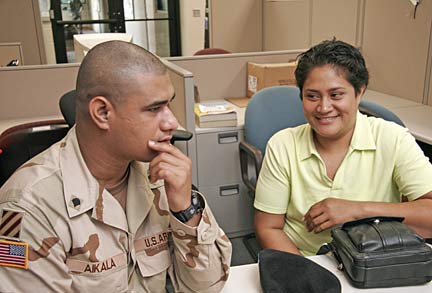
|
Bombs ‘everywhere’ in Iraq
A recovering soldier becomes
the 27th Purple Heart winner
in his unit, all hit by IEDs
Improvised explosive devices like the one that wounded Spc. Charles Aikala "can be found everywhere" in Iraq.
Unit's history a tough
|
"They also are very high tech and can be set off by a cell phone. Some are triggered by a timer or a fuse," said Aikala, of Bravo Company, 100th Battalion, 442nd Infantry. He is the latest member of the 100th Battalion to be awarded a Purple Heart, for the wound he received while on a routine patrol May 21. So far, 27 members of the 100th Battalion have been awarded the Purple Heart, all for wounds caused by homemade bombs. The battalion is one of three assigned to the Hawaii Army National Guard's 29th Brigade Combat Team.
Last month, there were about 700 attacks against American forces using IEDs, the highest number since the invasion of Iraq in 2003, Lt. Gen. John Vines, a senior American ground commander in Iraq, told reporters Tuesday.
Improvised explosive devices have become the No. 1 cause of U.S. combat deaths in Iraq.
The Internet site Iraq Coalition Casualty Count says deaths due to IEDs rose by more than 41 percent in the first five months of 2005 over the same period last year, and account for nearly 52 percent of the 261 U.S. combat deaths this year. In 2004, IEDs accounted for 189 of the 720 U.S. combat deaths -- about 26 percent. In the first five months of last year, 85 deaths were attributed to IEDs.
For the past three months, members of Bravo Company, who are all from American Samoa, have been involved in round-the-clock patrols near Balad.
At 2 a.m. on May 21, Aikala was the gunner in the lead Humvee of a four-vehicle convoy.
As the operator of a .50-caliber machine gun, Aikala stands in the Humvee -- the only member in the convoy who is exposed to enemy fire.
The homemade bomb exploded about 25 feet from him, and the shrapnel tore into his arm.
Aikala was wearing night-vision goggles at the time. "All I could see was sparks."
He didn't know he had been wounded until moments later, after he climbed down from the Humvee and "I felt wetness on my elbow.
"I asked the medic to check me out with his flashlight, and saw that my sleeve was covered with blood."
Shrapnel had torn a hole in his left arm about 3 inches in diameter. He was the only member of the patrol wounded by the homemade bomb.
He has been living at the Fisher House at Tripler Army Medical Center since May 29 but is hoping to spend some of his 30-day convalescent leave in American Samoa with his wife, Maggie, and their three children.
Maggie Aikala said she was called by a member of her husband's unit the day after her husband was wounded.
"They told me that his injuries were minor," she added, "but my mind was going all over the place. ... How I wanted to be there to help him."
She said her children call the wounds "boo-boo": "They always say, 'Can we see Daddy? We miss Daddy. We want to see Daddy's boo-boo.' But they have been taking it all well."
E-mail to City Desk
[News] [Business] [Features] [Sports] [Editorial] [Do It Electric!]
[Classified Ads] [Search] [Subscribe] [Info] [Letter to Editor]
[Feedback]
